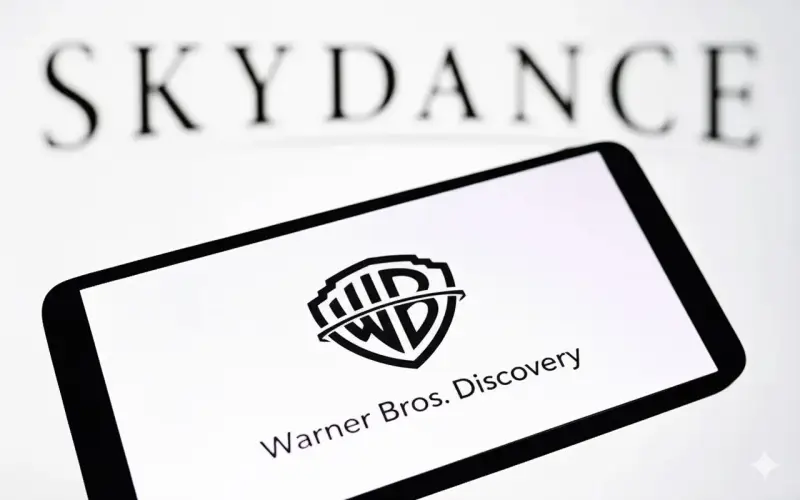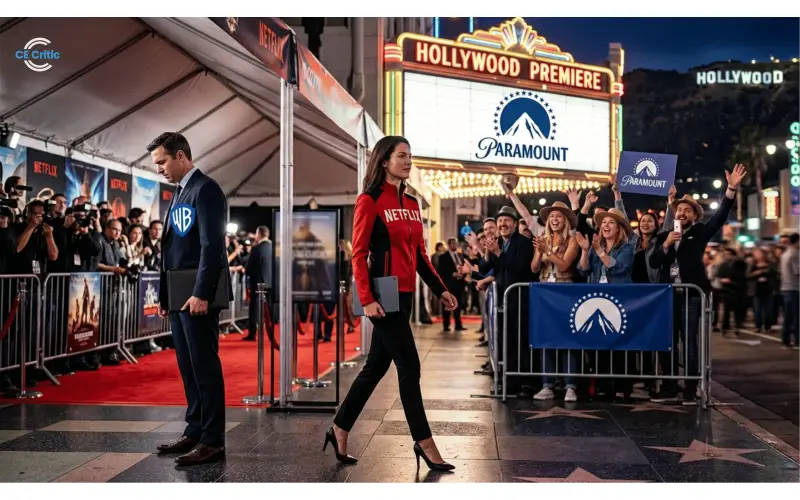By: Dipin Sehdev
Hollywood consolidation is accelerating at a pace that once seemed unthinkable. Just weeks after Skydance and Paramount Global tied the knot in an $8.4 billion deal, David Ellison’s Skydance, backed by his father Larry Ellison, is reportedly preparing a majority-cash bid for Warner Bros. Discovery. If successful, it would unite three entertainment titans—Paramount, Warner Bros., and Skydance—under one roof, forming a media powerhouse with control over some of the most valuable intellectual property in the world.
Think Superman, Batman, Wonder Woman, Harry Potter, Game of Thrones, Friends, CNN, CBS News, Nickelodeon, Star Trek, SpongeBob SquarePants, and The Matrix—all under a single corporate banner. In streaming, the combination would fuse HBO Max (recently rebranded back to HBO Max from Max) and Paramount+, creating a rival with the scale to challenge Netflix, Disney+, and Amazon Prime Video.
It’s a bold move that could reshape the balance of power in the entertainment industry—but also one that raises immediate concerns about consumer costs, competition, and content diversity.
A Bid Backed by Deep Pockets
According to reports first broken by The Wall Street Journal, the Ellison family is preparing a majority cash offer for all of Warner Bros. Discovery. That includes Warner Bros. Pictures, Warner Bros. Television, HBO, CNN, and the legacy cable networks like TNT, TBS, and Discovery Channel.
The financing would come largely from Larry Ellison, the Oracle co-founder and one of the world’s richest men, whose net worth has surged above $360 billion. His son David Ellison has already signaled that Skydance isn’t content with simply merging into Paramount Global—it’s building a content empire that can compete head-to-head with Big Tech.
Warner Bros. Discovery currently has a market cap of about $30 billion and carries another $30 billion in debt. Paramount Skydance’s market value before these reports was $16.4 billion. That imbalance means any acquisition would need substantial private financing. But analysts say it’s “doable,” given Ellison’s wealth and appetite for disruption.
Warner’s Ongoing Restructuring
Warner Bros. Discovery CEO David Zaslav has spent the past year trying to untangle the company’s 2021 merger, restructuring the business into two operating divisions—one focused on the declining cable TV business, the other on studios and streaming.
The strategy was designed to reassure investors and chip away at Warner’s towering debt. Yet results have been mixed. Cable revenue continues to shrink, streaming growth has slowed, and investors have grown impatient.
For Warner shareholders, a cash-heavy exit could be far more appealing than waiting for Zaslav’s restructuring to bear fruit. “A cash-rich exit is far more appealing than waiting around for Zaslav’s restructuring magic to (maybe) pay off,” said eMarketer analyst Jeremy Goldman.
Consolidation Marches On
If this deal closes, it would mark one of the most significant consolidation moves in modern entertainment. Over the past decade, the number of independent Hollywood studios has steadily dwindled:
-
Disney swallowed 21st Century Fox in 2019.
-
Amazon acquired MGM in 2021.
-
Microsoft took over Activision Blizzard in 2023 (gaming, but same consolidation trend).
-
Now Paramount and Skydance are eyeing Warner Bros. Discovery.
Each wave of consolidation narrows the field of independent content producers, concentrates power, and creates mega-libraries of intellectual property. These content behemoths are increasingly structured to compete with Netflix, Apple, and Amazon—companies whose streaming services are fueled not just by entertainment revenue but by trillion-dollar ecosystems.
For traditional media companies like Paramount and Warner, bulking up may be the only way to survive.
The Crown Jewels: What’s at Stake
The intellectual property portfolio that would come with Warner Bros. Discovery is staggering. If this deal were to go through, Paramount Skydance would control:
-
HBO: The home of Game of Thrones, House of the Dragon, The Last of Us, and Succession.
-
Warner Bros. Pictures: Blockbuster franchises like Harry Potter, Fantastic Beasts, The Matrix, and DC Comics.
-
DC Studios: Superman, Batman, Wonder Woman, Aquaman, and Justice League.
-
Warner Bros. Television: Syndication hits like Friends and The Big Bang Theory.
-
CNN: A global news leader.
-
Discovery Networks: HGTV, Food Network, TLC, and Discovery Channel.
-
Paramount Assets Already in Hand: CBS, MTV, Nickelodeon, Comedy Central, Paramount Pictures, and Paramount+.
In effect, the deal would give Skydance-Paramount control of not only the largest back catalogs in entertainment but also two of the most important brands in news, CNN and CBS News.
The Consumer Impact: Expect Rising Prices
When companies consolidate, consumers usually pay more. Antitrust experts warn that a Paramount-Warner merger could trigger higher subscription fees, fewer competing services, and more aggressive content bundling.
For example, if HBO Max and Paramount+ merge into a single service, subscribers may lose the option of choosing one at a lower price point. Bundling might streamline offerings, but history suggests that prices will rise—just as they did after Disney absorbed Hulu and ESPN+ into Disney+.
And with greater market power comes leverage against cable and streaming distributors, which could translate into higher carriage fees and ad rates. Those costs often get passed directly to subscribers.
“The DOJ will want to investigate whether the merger could lead to higher prices for consumers, reduce bargaining power for creators, and diminish content diversity,” said Washington-based antitrust attorney Andre Barlow.
Political Winds and Antitrust Scrutiny
Any deal of this size would undergo intense antitrust scrutiny. Under the Biden administration, regulators were aggressive in blocking media and tech mergers, but with a new administration in place, the climate may be more favorable. Larry Ellison’s ties to President Donald Trump could also play a role in smoothing the path forward.
Still, regulators will have to weigh the competitive impacts. Consolidating Warner and Paramount would reduce the number of independent studios and give the combined entity significant bargaining power in theatrical distribution, streaming, and licensing.
This could be especially concerning for creators, who might face fewer outlets bidding for their work. Independent producers and smaller studios could find themselves squeezed in negotiations.
Streaming Wars Enter a New Phase
If successful, the merger would instantly create a stronger rival to Netflix, Disney+, and Amazon Prime Video. Combined, HBO Max and Paramount+ would have a massive library of films, series, and live programming—potentially the largest in the industry.
The challenge will be integrating platforms without alienating subscribers. Both HBO Max and Paramount+ have struggled to find consistent subscriber growth, and both have undergone rebrands and strategic pivots. Bringing them together could create a more coherent offering, but execution will be key.
Meanwhile, Apple and Amazon loom large. Both companies treat streaming as a value-add to their hardware and retail ecosystems, rather than as a standalone business. That means they can afford to lose money on content acquisition in ways that Warner and Paramount cannot. To compete, Paramount Skydance will need scale—and this merger may be the only way to get there.
The Ellison Factor
The Ellison family’s involvement makes this bid unique. Unlike private equity, which typically seeks to slash costs and flip assets, the Ellisons appear to be in it for the long haul.
Larry Ellison’s fortune, fueled by Oracle, gives the group unprecedented financial firepower. David Ellison’s experience running Skydance, which has co-financed films like Top Gun: Maverick and Mission: Impossible – Dead Reckoning, shows he knows how to work with—and within—Hollywood.
Together, they represent a rare combination of capital and creative credibility.
What Comes Next
For now, no formal bid has been submitted. Warner Bros. Discovery could resist a takeover, preferring to continue its restructuring. Regulators could step in. And the massive financing required means the deal could still fall apart.
But one thing is clear: the race to consolidate media assets isn’t slowing down. As streaming matures and cable continues to decline, the winners will be the companies with the deepest libraries and the broadest reach.
If Paramount Skydance succeeds, Hollywood’s landscape will tilt dramatically. A single company would control Superman, Harry Potter, Star Trek, SpongeBob, Game of Thrones, CNN, CBS, Nickelodeon, and more.
For consumers, that may mean fewer streaming apps cluttering their devices—but also higher prices and less choice.
As one analyst put it: “This deal is the Hollywood equivalent of a sequel no one expected but everyone sort of saw coming.”





